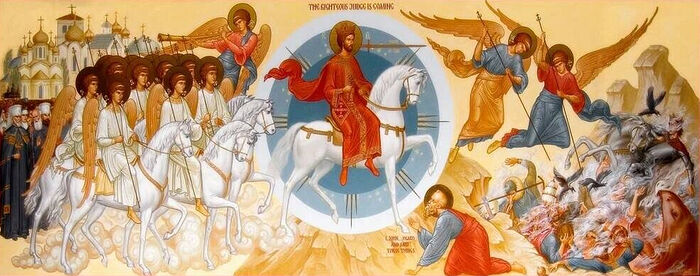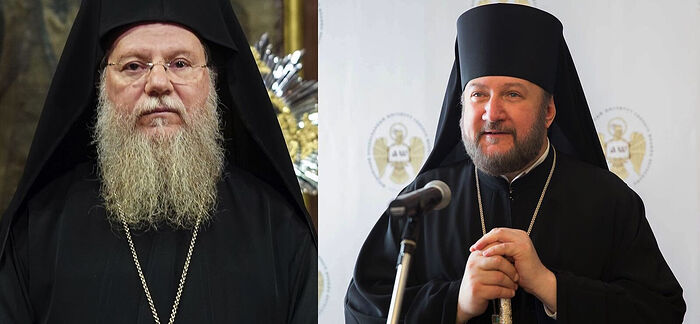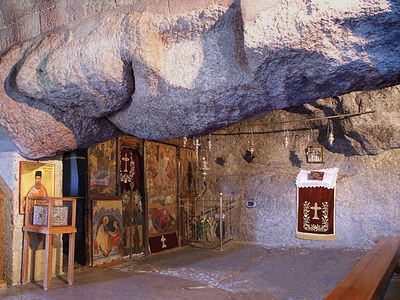 Revelation: Removing the VeilThis revelation was given by God to the Apostle John because we needed to know it.
Revelation: Removing the VeilThis revelation was given by God to the Apostle John because we needed to know it.
“>Part 1
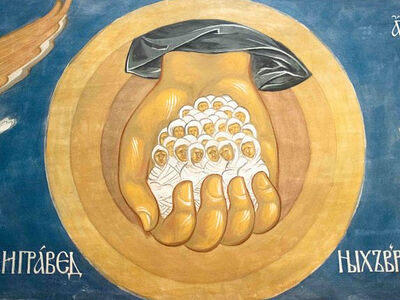 If Christ Is With Us, Death Is DefeatedThe book of Revelation teaches us a lot, especially when we begin to carefully delve into its words, when we see how Christ holds the world in His hands and acts with wisdom in all things.”>Part 2
If Christ Is With Us, Death Is DefeatedThe book of Revelation teaches us a lot, especially when we begin to carefully delve into its words, when we see how Christ holds the world in His hands and acts with wisdom in all things.”>Part 2
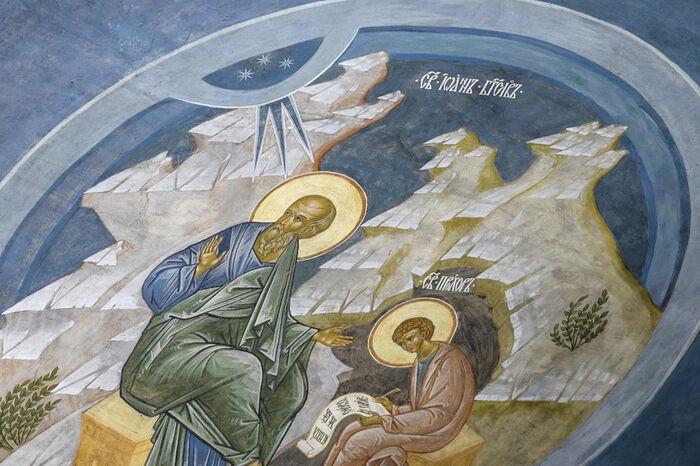
Last time, we said that with God’s help, we would talk about the  Why Study the Book of Revelation?We are beginning a study of the book of Revelation by St. John the Theologian. Perhaps it would be useful to ask ourselves: Why should we read and analyze this book?
Why Study the Book of Revelation?We are beginning a study of the book of Revelation by St. John the Theologian. Perhaps it would be useful to ask ourselves: Why should we read and analyze this book?
“>book of Revelation of the holy and glorious Apostle and Evangelist John the Theologian. We’ve taken on a very difficult task. It requires a lot of attention and much prayer that the Lord might preserve us and not permit us to say anything erroneous.
We don’t read Revelation to evaluate the circumstances of our times, or learn about future events, or figure out how many years we have left.
The Revelation of St. John the Theologian has the specific purpose of helping us draw near to God and giving us blessed hope and conviction that God will prevail in the end and that people who have hope and patience will be with God eternally.
Let’s begin with the first chapter. Revelation was written about two thousand years ago. It’s the last book of the New Testament, chronologically written last. Let’s see what the Apostle John says in the first verse:
The Revelation of Jesus Christ, which God gave unto Him, to shew unto His servants things which must shortly come to pass; and He sent and signified it by His angel unto His servant John (Rev. 1:1).
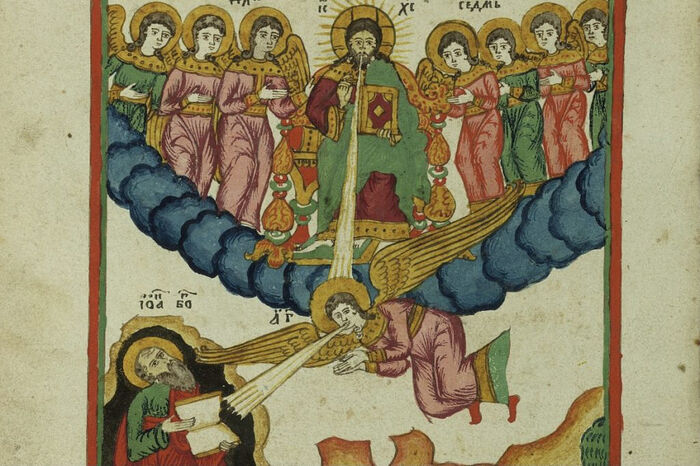 Illustration from Revelation with Patristic Commentaries, 1800
Illustration from Revelation with Patristic Commentaries, 1800
This book, as the text says, contains the revelation that God gave Jesus Christ to show His servants what is coming soon. The word “revelation” means there was something unknown, hidden, under a veil, and now it is being revealed. So God gives us the Revelation of Jesus Christ.
Christ says in the Gospel that no one knows when the  About the End of the WorldI am sure only of one thing—the fate of our world depends on our faith and repentance.
About the End of the WorldI am sure only of one thing—the fate of our world depends on our faith and repentance.
“>end of the world will come. No one, not even the Son. Neither the angels, nor the Son. And here we’re talking about the revelation given by God to Jesus Christ. God gave this revelation to Jesus Christ not because there’s anything He doesn’t know about or because the Father hides something from the Son. Elsewhere in the Holy Scriptures it says that everything the Father has He has given to the Son. The Son knows everything. There’s nothing unknown to Him. But we should know that the two natures of Christ are often manifested in Holy Scripture. Christ often acts as God, and sometimes as Man. In His human nature, Christ experienced hunger, thirst, He got tired, He slept, He died, because He was also Man. And as God, He resurrected Himself and others, worked miracles, and manifested His supernatural power. As Man, He asked: “Where have they laid Lazarus?” Not because He didn’t know, but because His human nature was showing its nature. Christ is perfect Man and perfect God.
The Revelation of Jesus Christ, which God gave unto Him means that Christ received this knowledge as Man, because His two natures are inseparable in Him. Christ is the God-Man. Christ’s human nature received this revelation from His Divinity and reveals to His servants all that we will read. The revelation is given to the servants of God.
Last time, we said that many false prophets have appeared in our day. There are many of them already, and there will be even more as we approach the end. And false prophets are one of the signs of the last times. Though not prophets, they will appear to be so. But only a servant of God can be a prophet—no one else. A servant isn’t some kind of captive, enslaved, dependent, subordinate man who has been deprived of his freedom. He’s a man—a holy and pure man who has freed himself from the passion and sins; and in his body and soul, in his mind and heart, the presence and grace of the Holy Spirit reigns. Christ only reveals His mysteries to His servants. No one else. Only the people of God, the saints, can receive revelations from God, and only they can interpret them, because a revelation, words from God, is given from God, from the Holy Spirit. They are recorded and transmitted orally by the saints, and only holy people can explain them correctly, which is why there are so many heresies.
Passionate people, moved by egotism, waywardness, and a rebellious spirit want to interpret Holy Scripture. Not having the Holy Spirit of God, not having purity of mind and heart, not being humble people, they want to interpret it in their own way. And you often hear some tragicomic things. You may ask: “Where does someone get such thoughts? Doesn’t he see that this is nonsense?” However, he has egotism that blinds the mind, and he says things like this without realizing it.
And there are quite serious people in public life who read so-called “prophetic books” with interest. What’s going on here? They’re simply of the same spirit as the authors of these books and ideas. They have a spirit of egotism, pride, and vainglory. Therefore God can’t enlighten them, and they become victims of people like those authors. But as for a humble and pure-hearted man who tests and seeks the will of God, God enlightens and guides him through life. Such a man understands what is true and what is false. And even if he gets confused in something, the Lord will not abandon him, seeing his good intention.
I have met such people who had both intelligence and status in society, who are educated, but they believe in foolhardy, futile things, and this amazed me. And when you try to figure it out, it turns out they’re infected with the spirit of pride.
I knew one man who constantly believed in some false prophecies. There are many such books being distributed now. One time he said to me: “You know, I could have become an exceptional figure in the Church, like  Closer Than My Own Father: Elder Paisios and His Spiritual Children, Part 1The path to Athos is open to men only. But in Greece there is a women’s monastery where they live according to strict Athonite rules and serve without electricity, by candlelight. This monastery, in the village of Souroti, was founded by Elder Paisios the Athonite, whose books have been so popular in the past few years in America and Russia. A correspondent of “Neskuchnii Sad” headed to Souroti to meet with people who remember Elder Paisios.
Closer Than My Own Father: Elder Paisios and His Spiritual Children, Part 1The path to Athos is open to men only. But in Greece there is a women’s monastery where they live according to strict Athonite rules and serve without electricity, by candlelight. This monastery, in the village of Souroti, was founded by Elder Paisios the Athonite, whose books have been so popular in the past few years in America and Russia. A correspondent of “Neskuchnii Sad” headed to Souroti to meet with people who remember Elder Paisios.
“>Fr. Paisios, like  Saint Porphyrios, Wonderworker of KavsokalivaAt the age of twelve he left for the Holy Mountain in secret, desiring to emulate Saint John the Hut Burner, whom he loved very much, after he had read his Life.”>Elder Porphyrios, had I wound up with monks, in the Church environment, amongst the priesthood.” He started believing all these false prophecies because the spirit of pride and arrogance lived within him, making him naïve enough to believe such things.
Saint Porphyrios, Wonderworker of KavsokalivaAt the age of twelve he left for the Holy Mountain in secret, desiring to emulate Saint John the Hut Burner, whom he loved very much, after he had read his Life.”>Elder Porphyrios, had I wound up with monks, in the Church environment, amongst the priesthood.” He started believing all these false prophecies because the spirit of pride and arrogance lived within him, making him naïve enough to believe such things.
False prophecies are often spread by mentally ill people who themselves begin to believe that they’re prophets. How do you get to the point where you start believing their prophecies? It means something’s going wrong.
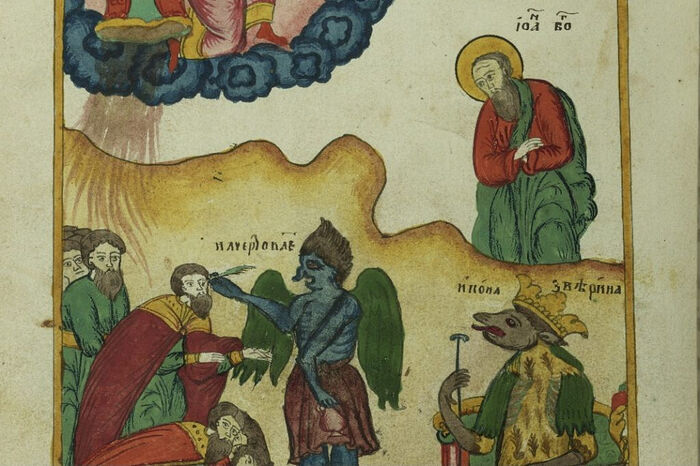 The Beast and the False Prophet, from Revelation with Patristic Commentaries, 1800
The Beast and the False Prophet, from Revelation with Patristic Commentaries, 1800
I remember there was a yogi, a teacher. The people believed he was God. He had a hobby of collecting Rolls Royces. He had forty or fifty different cars in his garage. I asked one young man to show me a photo of this guru whom they—educated, not some simpletons—considered God. They brought a photo, and what did I see? A young man, forty-two years old, successful and prosperous. Was this really the God Who created the heavens and the earth? The God of the whole world? What can you say here? Lord, have mercy! You don’t know what to say. This is “God”—in a Rolls Royce, with bank accounts and private planes for traveling? But people believed him. For pride, arrogance, and vanity, the Lord allowed their minds to either spread false prophecies or believe in them. It’s the era of prelest and delusion—what can you say here? You tell those coming to the Church—virtuous, experienced people—that these are all bad things.
Do you remember when here in Limassol, in Trakhoni, Mickey Mouse appeared on the wall? Everyone went to see it. I didn’t see anything. More serious and holy people also came and looked. All the people of God said with one voice that this wasn’t serious, it wasn’t from God. The Synod gathered, they discussed it, and they said it wasn’t from God; don’t believe it, don’t bother with it. It’s a deception and a trick, and perhaps something satanic. However, there are still people today who want to be in the Church, who commune, but believe it. You were told by experienced people, people of holy life, and you continue to believe what was drawn on the wall.
If you start to get to know such people better, you’ll realize they didn’t just make a mistake. We all make mistakes. But stubbornly remaining in error means your mind is in prelest, you like this delusion, you find solace in this spirit, which, according to our ever-memorable elder, is deaf and dumb. No matter how much you talk to a man who’s been seduced, he won’t hear it. No matter what you say, he won’t back down from his own opinion. You can work miracles for him, raise the dead, and he’ll stay where he was. This is a sign of a deceived man, when nothing can take him away from his thoughts. He doesn’t say, “You know, I can make mistakes. I believe, but being a man, I can also be deluded.” He doesn’t question whether his beliefs are correct. The signs of a deceived man are vainglory and stubbornness: “I know, I believe so much, I have studied and figured it out, and that’s how I understand it”—all of this is me.
Recently, there was a man holding talks in Limassol. He’s a doctor and tells interesting stories; he’s eloquent, educated. He came to see me so he could then tell others about it. He talked and talked and talked—all about himself. I asked if he goes to church, and he said he’s a Seventh Day Adventist. It’s a Protestant heresy. He talked a lot, and I stopped him: “Forgive me, but you’ve been talking for almost an hour now, and the whole time about yourself: what you do, what you talk about, what you believe in. You’ve said the word ‘I’ five hundred times already.” What else there is to say here? That’s how deluded people reveal themselves.
There’s a great example from the life of  St. Simeon Stylites, the ElderShunning worldly glory and striving again to find his lost solitude, the monk chose a previously unknown mode of asceticism. He went up a pillar six to eight feet high, and settled upon it in a little cell, devoting himself to intense prayer and fasting.
St. Simeon Stylites, the ElderShunning worldly glory and striving again to find his lost solitude, the monk chose a previously unknown mode of asceticism. He went up a pillar six to eight feet high, and settled upon it in a little cell, devoting himself to intense prayer and fasting.
“>St. Simeon the Stylite. When he climbed up the pillar and performed this previously unknown feat, fathers would come to him and say: “What are you doing there? This is the first time we’ve seen anything like this. What kind of asceticism is this—sitting on a pillar?” This pillar wasn’t like a telephone pole, but something like a minaret.
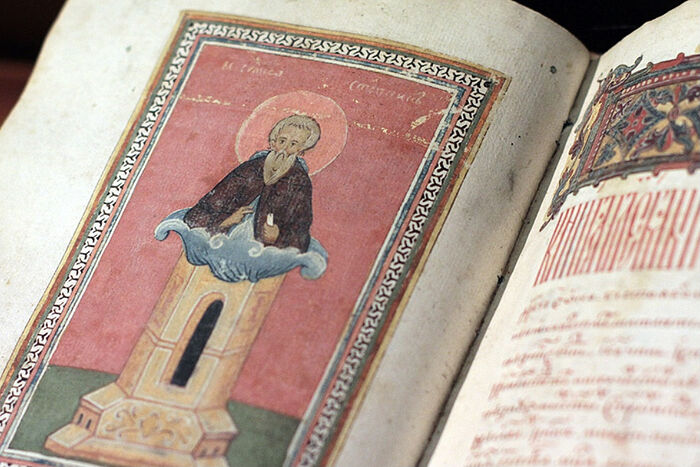
The fathers who lived nearby didn’t know about this asceticism and decided to test St. Simeon to figure out if it was from God or some kind of delusion. They decided to go tell him: “Father, this is wrong. You climbed up there on your pillar out of pride, egotism. Come down and don’t do this anymore.” If he obeys and comes down, then he’s a humble man, living for God, so let him continue. But if he doesn’t come down and starts explaining: “I did this because it’s what I decided for myself,” then we’ll bring him down by force—he’s deluded.
They went to his pillar and started shouting that what he was doing wasn’t good. St. Simeon answered them: “Forgive me, fathers. I’m coming down since you think that it’s bad and it tempts others. If you don’t like it, I’ll be happy to come down.” And he immediately climbed down. Then the fathers told him: “Go back up. Your labors are pleasing to God.”
This is what distinguishes a deceived man from a man of God. A man of God is known by his humility. He’s ready to leave aside his thoughts, his decisions and judgments, and always considers his reasonings: “I thought this was the right thing. But I’m a man and I can err; I don’t know.” He asks and listens to others. The proud, deluded, vainglorious egotist doesn’t listen to anyone. He said it, and that’s it—he’ll never doubt it, he’ll never say, “Maybe I was wrong?” These are extremes, of course. But don’t think that the deluded man falls from Heaven or that he becomes that way overnight. Man falls into delusion because from childhood he gradually learns to behave selfishly, he learns vanity and arrogance. A proud man, who only listens to himself and no one else, becomes an animal. If someone dares to argue with him or tell him, “You know, you were wrong; you made a mistake,” he loses his temper. And gradually, he falls into delusion.
To be continued…
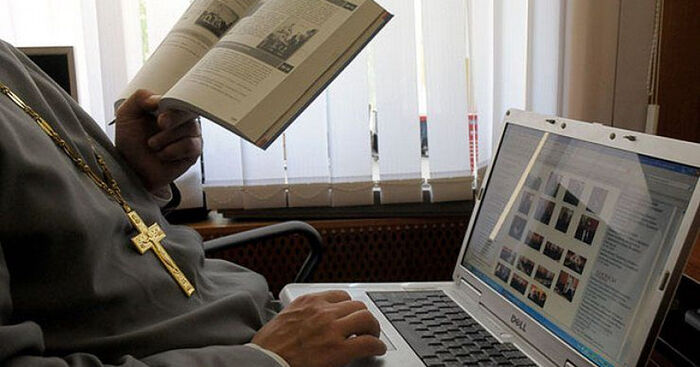 Photo: gorthodox.com
Photo: gorthodox.com 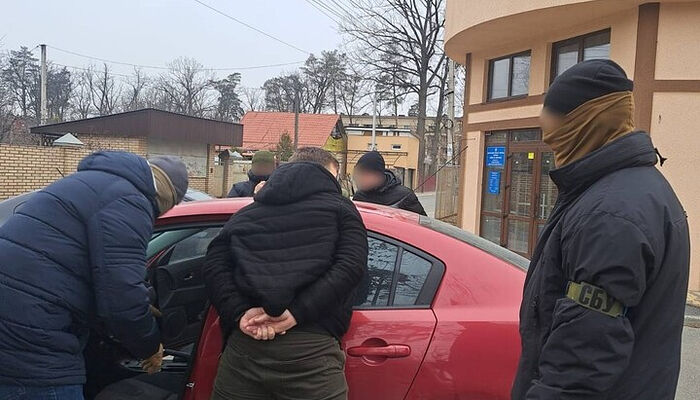
 Revelation: Removing the VeilThis revelation was given by God to the Apostle John because we needed to know it.
Revelation: Removing the VeilThis revelation was given by God to the Apostle John because we needed to know it. If Christ Is With Us, Death Is DefeatedThe book of Revelation teaches us a lot, especially when we begin to carefully delve into its words, when we see how Christ holds the world in His hands and acts with wisdom in all things.”>Part 2
If Christ Is With Us, Death Is DefeatedThe book of Revelation teaches us a lot, especially when we begin to carefully delve into its words, when we see how Christ holds the world in His hands and acts with wisdom in all things.”>Part 2 
 Why Study the Book of Revelation?We are beginning a study of the book of Revelation by St. John the Theologian. Perhaps it would be useful to ask ourselves: Why should we read and analyze this book?
Why Study the Book of Revelation?We are beginning a study of the book of Revelation by St. John the Theologian. Perhaps it would be useful to ask ourselves: Why should we read and analyze this book?
 About the End of the WorldI am sure only of one thing—the fate of our world depends on our faith and repentance.
About the End of the WorldI am sure only of one thing—the fate of our world depends on our faith and repentance. Closer Than My Own Father: Elder Paisios and His Spiritual Children, Part 1The path to Athos is open to men only. But in Greece there is a women’s monastery where they live according to strict Athonite rules and serve without electricity, by candlelight. This monastery, in the village of Souroti, was founded by Elder Paisios the Athonite, whose books have been so popular in the past few years in America and Russia. A correspondent of “Neskuchnii Sad” headed to Souroti to meet with people who remember Elder Paisios.
Closer Than My Own Father: Elder Paisios and His Spiritual Children, Part 1The path to Athos is open to men only. But in Greece there is a women’s monastery where they live according to strict Athonite rules and serve without electricity, by candlelight. This monastery, in the village of Souroti, was founded by Elder Paisios the Athonite, whose books have been so popular in the past few years in America and Russia. A correspondent of “Neskuchnii Sad” headed to Souroti to meet with people who remember Elder Paisios. Saint Porphyrios, Wonderworker of KavsokalivaAt the age of twelve he left for the Holy Mountain in secret, desiring to emulate Saint John the Hut Burner, whom he loved very much, after he had read his Life.”>Elder Porphyrios, had I wound up with monks, in the Church environment, amongst the priesthood.” He started believing all these false prophecies because the spirit of pride and arrogance lived within him, making him naïve enough to believe such things.
Saint Porphyrios, Wonderworker of KavsokalivaAt the age of twelve he left for the Holy Mountain in secret, desiring to emulate Saint John the Hut Burner, whom he loved very much, after he had read his Life.”>Elder Porphyrios, had I wound up with monks, in the Church environment, amongst the priesthood.” He started believing all these false prophecies because the spirit of pride and arrogance lived within him, making him naïve enough to believe such things. 
 St. Simeon Stylites, the ElderShunning worldly glory and striving again to find his lost solitude, the monk chose a previously unknown mode of asceticism. He went up a pillar six to eight feet high, and settled upon it in a little cell, devoting himself to intense prayer and fasting.
St. Simeon Stylites, the ElderShunning worldly glory and striving again to find his lost solitude, the monk chose a previously unknown mode of asceticism. He went up a pillar six to eight feet high, and settled upon it in a little cell, devoting himself to intense prayer and fasting.
